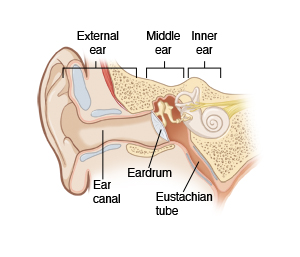Earache Without Infection (Child)

Earaches can happen without an infection. This can occur when fluid builds up behind the eardrum, which may cause pain and reduced hearing. This is called serous otitis media. It means fluid in the middle ear. It can happen when your child has a cold and congestion blocks the passage that drains the middle ear (eustachian tube). It may occur after a middle ear infection caused by bacteria. Or it may sometimes happen with nasal allergies. The earache may come and go. Your child may also hear clicking or popping sounds when chewing or swallowing.
It may take several weeks to 3 months for the fluid to go away on its own. If your child is having pain, over-the-counter pain relievers can help. Ask your child's doctor which medicines are safe for your child. No infection is currently present, so antibiotics will not help. This condition can sometimes become an ear infection, so let the doctor know if your child develops a fever or drainage from the ear or if symptoms get worse.
If your child doesn't get better after 3 months, they may need surgery to drain the fluid and insert ear tubes (tympanostomy). Your child may also need the tubes if they are at risk for speech, language, or learning problems. Or your child may need the ear tubes if they have hearing loss.
Home care
Your child's doctor may have you keep an eye on your child (watchful waiting) for up to 3 months. This means letting the doctor know if your child's symptoms don't get better or get worse.
Follow-up care
Follow up with your child’s doctor as directed. It's important to make sure the fluid goes away in the future.
When to get medical advice
Contact your child's doctor or get medical care right away if:
-
Your child has a fever of 100.4°F (38°C) or higher, or as directed by your doctor.
-
Your child's ear pain gets worse.
-
Discharge, blood, or a foul odor is coming from the ear.
-
Your child has an unusual decrease in activity or unusual fussiness.
-
Fluid or blood is draining from the ear.
Call 911
Call 911 if your child has:
Online Medical Reviewer:
Chelsey Schilling BSN RN
Online Medical Reviewer:
Riley Holtz RN BS
Date Last Reviewed:
5/1/2025
© 2000-2025 The StayWell Company, LLC. All rights reserved. This information is not intended as a substitute for professional medical care. Always follow your healthcare professional's instructions.